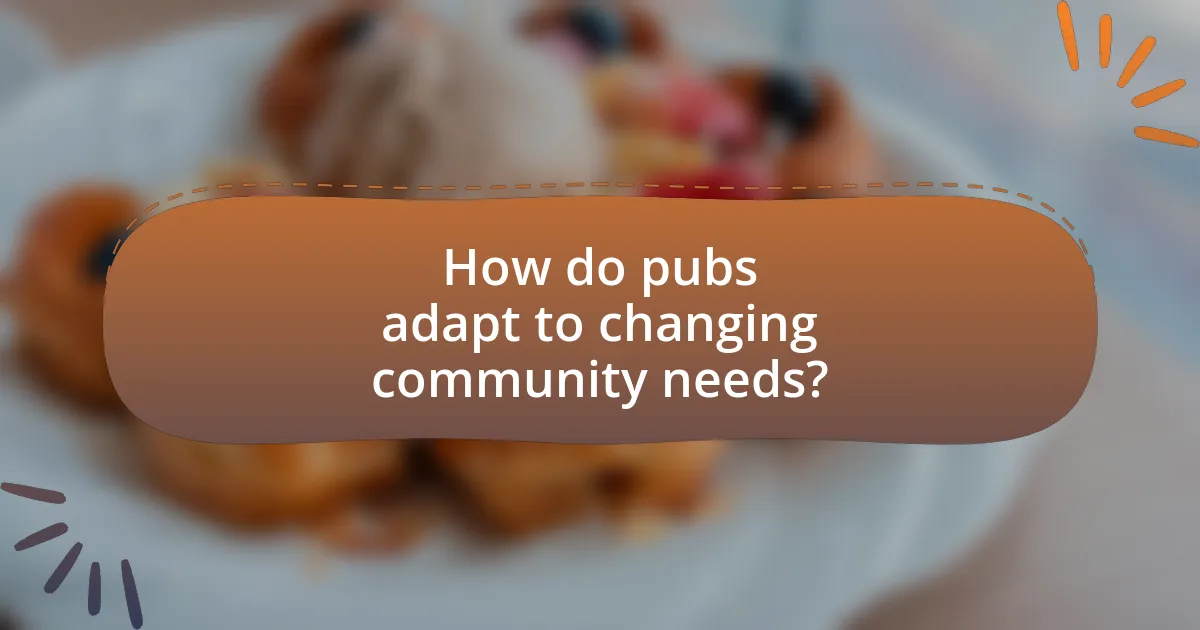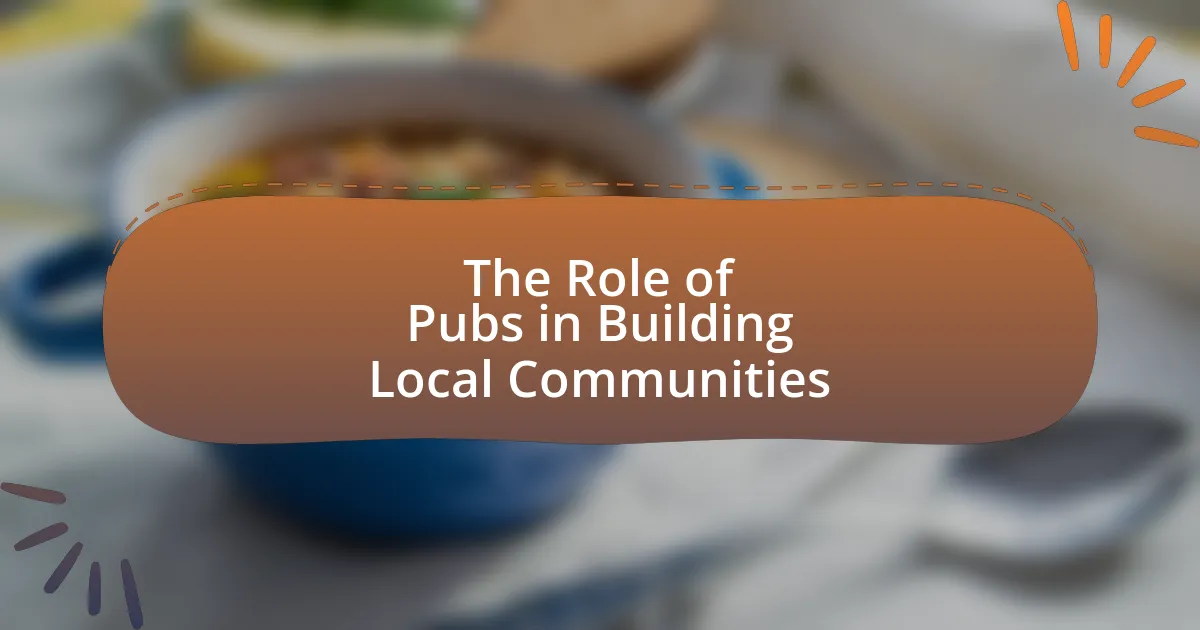Pubs serve as essential social hubs that contribute significantly to building local communities. They foster social cohesion by providing spaces for diverse groups to gather, share experiences, and engage in community activities, such as trivia nights and live music events. Research indicates that pubs enhance local engagement, support economic vitality, and reflect the cultural identity of their locales. However, they face challenges such as changing consumer behaviors and regulatory pressures that impact their sustainability and community involvement. This article explores the multifaceted role of pubs in strengthening community ties, their economic contributions, and the strategies they employ to adapt to evolving societal needs.

What is the role of pubs in building local communities?
Pubs play a crucial role in building local communities by serving as social hubs that foster connections among residents. They provide a space for individuals to gather, share experiences, and engage in conversations, which strengthens community ties. Research indicates that pubs contribute to social cohesion by hosting events, supporting local initiatives, and offering a platform for cultural exchange. For instance, a study by the University of Leeds found that community pubs significantly enhance local engagement and participation, leading to increased trust and collaboration among residents.
How do pubs contribute to social cohesion?
Pubs contribute to social cohesion by serving as communal spaces where individuals from diverse backgrounds can gather, interact, and build relationships. These establishments foster a sense of belonging and community through shared experiences, such as social events, sports viewings, and local gatherings. Research indicates that regular social interactions in pubs can enhance trust and cooperation among community members, leading to stronger social networks. For instance, a study by the University of Kent found that pubs play a crucial role in promoting social ties, with 70% of respondents reporting that they feel more connected to their community when they frequent local pubs.
What activities do pubs host that foster community interaction?
Pubs host various activities that foster community interaction, including trivia nights, live music events, and community fundraisers. Trivia nights encourage teamwork and friendly competition among patrons, while live music events provide a platform for local artists and create a shared experience for attendees. Community fundraisers often involve local charities, bringing residents together for a common cause and strengthening social bonds. These activities not only enhance the social fabric of the community but also contribute to the local economy by attracting visitors and supporting local talent.
How do pubs serve as gathering places for diverse groups?
Pubs serve as gathering places for diverse groups by providing a communal space where individuals from various backgrounds can come together to socialize and engage. This inclusivity is facilitated by the relaxed atmosphere of pubs, which encourages interaction among patrons, regardless of their age, ethnicity, or social status. Research indicates that pubs often host events such as trivia nights, live music, and community gatherings, which attract a wide range of attendees and foster a sense of belonging. For example, a study by the University of Leeds found that local pubs significantly contribute to community cohesion by acting as informal meeting points where people can build relationships and share experiences.
Why are pubs considered vital to local culture?
Pubs are considered vital to local culture because they serve as communal gathering spaces that foster social interaction and community cohesion. These establishments often host events, support local businesses, and provide a platform for cultural expression, such as music and art. Research indicates that pubs contribute to social capital by enhancing relationships among community members, which is essential for building strong, resilient neighborhoods. For example, a study by the University of Cambridge found that regular pub attendance is linked to increased community engagement and a sense of belonging among residents.
What unique traditions do pubs uphold within communities?
Pubs uphold unique traditions within communities by serving as social hubs that foster connection and cultural identity. These establishments often host events such as quiz nights, live music, and community gatherings, which encourage local participation and strengthen relationships among residents. For example, many pubs celebrate local festivals or holidays with themed events, reinforcing community bonds and shared experiences. Additionally, the tradition of “pub quizzes” not only entertains but also promotes teamwork and friendly competition among locals, enhancing social cohesion. Historical data indicates that pubs have been central to community life for centuries, acting as venues for discussions, celebrations, and support networks, thus solidifying their role in community building.
How do pubs reflect the history and identity of their locales?
Pubs reflect the history and identity of their locales by serving as social hubs that embody local traditions, culture, and historical narratives. For instance, many pubs are housed in historic buildings that date back centuries, showcasing architectural styles and craftsmanship unique to the region. Additionally, the names and themes of pubs often pay homage to local landmarks, historical events, or notable figures, reinforcing a sense of community pride and identity. Research indicates that pubs contribute to local economies and social cohesion, with a study by the Campaign for Real Ale (CAMRA) highlighting that traditional pubs are vital for preserving local heritage and fostering community engagement.
What economic impacts do pubs have on local communities?
Pubs significantly contribute to the economic vitality of local communities by generating employment, stimulating local businesses, and enhancing tourism. They create jobs not only within the pub itself but also in related sectors such as food supply, entertainment, and hospitality. For instance, a study by the British Beer and Pub Association found that pubs support over 900,000 jobs across the UK, demonstrating their role as major employers in local economies. Additionally, pubs often source food and beverages from local suppliers, thereby injecting money into the community and fostering local entrepreneurship. Furthermore, pubs attract visitors, which boosts spending in surrounding businesses such as shops and hotels, contributing to a vibrant local economy.
How do pubs support local businesses and employment?
Pubs support local businesses and employment by serving as hubs for community engagement and economic activity. They often source food and beverages from nearby suppliers, which stimulates local agriculture and production industries. For instance, a study by the Campaign for Real Ale (CAMRA) found that local pubs contribute approximately £23 billion to the UK economy annually, supporting around 900,000 jobs. Additionally, pubs create employment opportunities directly through hiring staff and indirectly by attracting customers to nearby shops and services, thereby fostering a vibrant local economy.
What role do pubs play in local tourism and events?
Pubs serve as vital hubs for local tourism and events by providing a social gathering space that attracts both residents and visitors. They often host community events, live music, and themed nights, which enhance the local cultural experience and draw tourists seeking authentic interactions. According to a study by the Campaign for Real Ale (CAMRA), pubs contribute approximately £23 billion to the UK economy annually, highlighting their significance in local tourism. Furthermore, pubs frequently collaborate with local breweries and artisans, promoting regional products and fostering a sense of place that appeals to tourists.

How do pubs adapt to changing community needs?
Pubs adapt to changing community needs by diversifying their offerings and engaging with local events. For instance, many pubs now provide a range of food options, including vegetarian and vegan dishes, to cater to dietary preferences. Additionally, they often host community events such as quiz nights, live music, and charity fundraisers, which foster social interaction and strengthen community ties. According to a report by the Campaign for Real Ale (CAMRA), 70% of pubs have implemented community-focused initiatives to remain relevant and support local culture. This adaptability not only enhances customer loyalty but also positions pubs as vital community hubs.
What strategies do pubs use to remain relevant in modern society?
Pubs employ various strategies to remain relevant in modern society, including diversifying their offerings, enhancing customer experience, and engaging with the community. By introducing a wider range of beverages, including craft beers and non-alcoholic options, pubs cater to changing consumer preferences. Additionally, many pubs host events such as trivia nights, live music, and community gatherings, which foster social interaction and attract diverse clientele. Furthermore, establishing partnerships with local businesses and participating in community initiatives strengthens their role as community hubs. According to a 2021 report by the British Beer and Pub Association, pubs that actively engage with their local communities see a 20% increase in customer loyalty, demonstrating the effectiveness of these strategies in maintaining relevance.
How do pubs incorporate technology to enhance customer experience?
Pubs incorporate technology to enhance customer experience by utilizing digital ordering systems, mobile apps, and social media engagement. Digital ordering systems streamline the process, allowing customers to place orders directly from their smartphones, reducing wait times and improving service efficiency. Mobile apps often provide loyalty programs and promotions, encouraging repeat visits and customer retention. Additionally, social media platforms enable pubs to interact with patrons, share events, and gather feedback, fostering a sense of community and connection. These technological integrations have been shown to increase customer satisfaction and engagement, as evidenced by a 2021 survey indicating that 70% of customers prefer venues that offer mobile ordering options.
What changes have pubs made in response to demographic shifts?
Pubs have adapted to demographic shifts by diversifying their offerings and creating inclusive environments. For instance, many pubs now provide a wider range of food options, including vegetarian and vegan dishes, to cater to changing dietary preferences. Additionally, pubs have implemented family-friendly policies, such as designated play areas and kid-friendly menus, to attract younger families. According to a report by the British Beer and Pub Association, 60% of pubs have introduced events like quiz nights and live music to engage a broader audience, reflecting the interests of younger demographics. These changes demonstrate how pubs are evolving to meet the needs of their communities.
Why is community feedback important for pubs?
Community feedback is important for pubs because it helps them understand customer preferences and improve their offerings. By actively seeking and incorporating feedback, pubs can tailor their services, menu items, and events to better meet the needs of their patrons, fostering a sense of community and loyalty. Research indicates that establishments that engage with their customers through feedback mechanisms see increased customer satisfaction and retention rates, which are crucial for long-term success in the hospitality industry.
How do pubs engage with local residents to improve services?
Pubs engage with local residents to improve services by hosting community events and soliciting feedback. By organizing activities such as quiz nights, live music, and charity fundraisers, pubs create a social hub that encourages local participation. Additionally, many pubs actively seek input from patrons through surveys or informal conversations, allowing them to tailor their offerings to meet community preferences. This engagement not only enhances customer satisfaction but also fosters a sense of belonging among residents, ultimately leading to increased patronage and loyalty.
What methods do pubs use to gather and implement community suggestions?
Pubs gather and implement community suggestions primarily through feedback forms, suggestion boxes, social media engagement, and community meetings. Feedback forms allow patrons to express their opinions directly, while suggestion boxes provide an anonymous way for customers to share ideas. Social media platforms enable pubs to interact with the community, soliciting input on events and services. Community meetings foster direct dialogue between pub management and local residents, facilitating the discussion of suggestions and concerns. These methods are effective as they create a channel for open communication, ensuring that the pub remains responsive to the needs and preferences of the community it serves.

What challenges do pubs face in building local communities?
Pubs face several challenges in building local communities, primarily due to changing consumer behaviors and economic pressures. The rise of digital entertainment options, such as streaming services and social media, has led to a decline in traditional pub attendance, making it difficult for these establishments to foster community engagement. Additionally, economic factors like rising operational costs and competition from other venues, such as cafes and restaurants, further strain pubs’ ability to serve as community hubs. According to a report by the Campaign for Real Ale (CAMRA), over 11,000 pubs in the UK closed between 2000 and 2019, highlighting the significant impact of these challenges on local community building.
How do economic factors impact the sustainability of pubs?
Economic factors significantly impact the sustainability of pubs by influencing their operational costs, pricing strategies, and customer spending behavior. For instance, fluctuations in the economy can lead to changes in disposable income, affecting how much consumers are willing to spend on dining and entertainment, including pub visits. According to a report by the British Beer and Pub Association, a 1% increase in consumer spending can lead to a 0.5% increase in pub sales, highlighting the direct correlation between economic conditions and pub revenue. Additionally, rising costs of goods, such as food and alcohol, can squeeze profit margins, forcing pubs to either increase prices or reduce quality, both of which can deter customers. Therefore, economic factors play a crucial role in determining the viability and longevity of pubs within local communities.
What are the effects of rising costs on pub operations?
Rising costs significantly impact pub operations by increasing overhead expenses, which can lead to reduced profit margins. As costs for ingredients, utilities, and labor rise, pubs may be forced to increase prices for customers, potentially driving away patrons. According to a 2022 survey by the British Beer and Pub Association, 70% of pubs reported that rising costs have led to menu price increases, with many also reducing staff hours or cutting back on services to manage expenses. This financial strain can hinder a pub’s ability to invest in community events and local partnerships, ultimately affecting their role in fostering local community engagement.
How do changing drinking habits affect pub attendance?
Changing drinking habits negatively affect pub attendance by reducing the frequency and duration of visits. For instance, a shift towards moderation and health-conscious choices has led many individuals to drink less alcohol or opt for non-alcoholic beverages, resulting in fewer patrons at pubs. According to a report by the Office for National Statistics, between 2005 and 2019, the percentage of adults in the UK who reported drinking alcohol at least once a week decreased from 63% to 54%. This decline in regular drinking correlates with a decrease in pub attendance, as fewer customers frequent these establishments for socializing.
What regulatory challenges do pubs encounter?
Pubs encounter several regulatory challenges, including licensing requirements, health and safety regulations, and compliance with alcohol sale laws. Licensing requirements often involve complex applications and renewals, which can be time-consuming and costly for pub owners. Health and safety regulations mandate strict adherence to food safety standards and building codes, necessitating regular inspections and potential renovations. Additionally, compliance with alcohol sale laws, such as age verification and responsible service practices, imposes further operational constraints. These challenges can significantly impact the financial viability and operational flexibility of pubs, making it essential for owners to stay informed and compliant with evolving regulations.
How do licensing laws impact pub operations and community engagement?
Licensing laws significantly impact pub operations and community engagement by regulating hours of operation, types of alcohol served, and the overall atmosphere of the establishment. These laws dictate when pubs can serve alcohol, which influences their ability to host events and attract patrons, thereby affecting their role as community hubs. For instance, stricter licensing regulations may limit late-night operations, reducing opportunities for social interaction and community events, while more lenient laws can encourage vibrant nightlife and community gatherings. Research from the Institute of Alcohol Studies indicates that pubs operating under flexible licensing laws tend to have higher levels of community engagement, as they can adapt their services to meet local needs and preferences.
What health and safety regulations must pubs comply with?
Pubs must comply with several health and safety regulations, including the Health and Safety at Work Act 1974, which mandates that employers ensure the health, safety, and welfare of their employees and patrons. Additionally, pubs must adhere to the Food Safety Act 1990, which requires proper food handling and hygiene practices to prevent foodborne illnesses. Fire safety regulations, such as the Regulatory Reform (Fire Safety) Order 2005, also apply, necessitating risk assessments and adequate fire safety measures. Compliance with these regulations is essential for protecting public health and ensuring a safe environment for both staff and customers.
What best practices can pubs adopt to strengthen community ties?
Pubs can strengthen community ties by actively engaging in local events and supporting community initiatives. By hosting regular events such as trivia nights, live music, or charity fundraisers, pubs create a space for residents to gather and connect. Research indicates that community-oriented businesses, like pubs, that participate in local activities foster a sense of belonging and loyalty among patrons. For example, a study by the Institute of Community Studies found that local pubs that engage with their communities see a 30% increase in customer loyalty and patronage. Additionally, collaborating with local organizations and charities not only enhances the pub’s reputation but also reinforces its role as a community hub.
How can pubs create inclusive environments for all community members?
Pubs can create inclusive environments for all community members by implementing policies and practices that promote diversity and accessibility. This includes offering a variety of seating arrangements to accommodate different needs, providing menus that cater to various dietary restrictions, and hosting events that celebrate different cultures and communities. Research indicates that inclusive spaces lead to increased patronage; for example, a study by the Institute of Community Studies found that pubs that actively engage with diverse groups see a 30% increase in customer satisfaction and loyalty. Additionally, training staff in cultural competency can enhance interactions with all patrons, fostering a welcoming atmosphere.
What role do community events play in enhancing pub engagement?
Community events significantly enhance pub engagement by fostering social interaction and creating a sense of belonging among patrons. These events, such as trivia nights, live music, and themed parties, attract diverse groups, encouraging regular attendance and participation. Research indicates that pubs hosting community events see a 30% increase in foot traffic and customer retention, as these gatherings provide opportunities for locals to connect and build relationships. This engagement not only boosts sales but also strengthens the pub’s role as a community hub, reinforcing its importance in local social dynamics.
